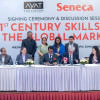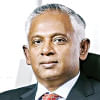The job market is transforming, university education should too

Imagine for a moment you are a university professor, in front of you are seated 30 students, and you have their best interests at heart. How do you equip someone now with the necessary skills for a job in five to ten years, that does not even exist today? A new role in a new sector we cannot possibly fathom just yet. A daunting task, isn't it? But this is the exact question we asked ourselves in a recent series of meetings in the Graduate School of Management (GSM) at BRAC University. To assist in our work, we scrolled through the 21st-century skills as defined by the World Economic Forum, which we found were provided with a rather close expiry date. However, doing a curriculum review today, knowing the red tape and associated time until implementation, we need at least an eight to ten-year time frame.
Recently, we had the honour of moderating a panel with a very experienced group of human resources (HR) leaders from Nestle, bKash, Grameenphone, Renata, Standard Chartered, and the World Food Programme. We confronted them with this question, and their response was rather astonishing.
They all agreed that the content of the actual curriculum does not matter too much (which is something we actually put a big focus on to date)—what matters are the methods of teaching being used and the skills being acquired. Those, they argued, would be largely independent of the actual discipline. Moreover, since the pandemic, many young candidates have literally transformed themselves through self-paced online learning, meaning that a marketing graduate in today's world no longer necessarily ends up in the marketing department or a finance student in the finance department. These boundaries have been largely softened, and instead, now we have more versatility in students and more flexibility in employment.
Adding onto that (for the student reader of this article), in your next interview, prepare yourselves for the following questions: what did you do in 2020? How did you deal with the pandemic, what did you learn during that time, and how did you use it to gain a better understanding of the world and yourself? These are just some of the questions an interviewer might ask you.
It was in August 2011 that Marc Andreessen coined the famous phrase "Software is eating the world" in a Wall Street Journal opinion article. This easily leads to the assumption that when choosing a subject, the student should rather focus on software engineering related topics. However, our panelists stressed that they did not expect their applicants to always be tech-savvy, it was rather the awareness and curiosity for technological change that was a must-have (again, independent of discipline!) and that it was crucial to have a general awareness of what is going on in the business world. The recommendation was to follow key leaders on LinkedIn (not Facebook!) and see what they are concerning themselves with.
So where does that leave us at the GSM? We need, and to some degree have already been forced (given the closure of universities due to Covid-19), to transform our way of teaching. As Jack Ma fittingly put it, if machines are to take over, you need to find your niche where you can compete with them. This leads us to think, not about how to teach someone to learn a text by heart in a short time, but for example, about how a leader shows empathy, something which the smartest algorithm will have an extremely difficult time to learn. Or about how to reflect and critically judge based on strong ethical foundations. As the late Marvin Minsky, co-founder of MIT's Artificial Intelligence Laboratory, put it: "No computer has ever been designed that is ever aware of what it's doing".
BRAC University's online learning platform buX allows students to study in a self-paced manner. Nowadays, by default, all exams are open-book, or rather open-Internet, which means the questions we ask must hit exactly the points which our HR leaders were highlighting—critical thinking, knowing what is important and what is not. If I have the whole Internet at my fingertips, the exam questions need to test exactly those skills, otherwise what value would the student be adding if (s)he simply copies from the slides that may have been distributed? The panelists even went so far as to recommend leaving the PowerPoint at home altogether and to focus only on engagement, because students have to learn how to operate in and contribute to a group effectively. So it is not so much content after all, but rather style, methods and the skills you are targeting for your students to acquire through everything you do as a teacher.
In addition, we have been particularly happy about this remark from our HR leaders, stating that there needs to be a lot more interaction between the corporates and the students, and internships are not a part of that. Building on the large success of Bangladesh's freelance community that provides services for companies across the world and a strong up-and-coming entrepreneurship community, it was suggested by the panel to also focus on these kinds of targeted engagements with corporates, for example, via an opportunity marketplace. Why not invite corporates and representatives from startups over, not only for motivational speeches but also to engage with the students for an active interaction?
In summary and borrowing from Marvin Minsky once more: "If you understand something in only one way, then you don't really understand it at all. The secret of what anything means to us depends on how we've connected it to all other things we know. Well-connected representations let you turn ideas around in your mind, to envision things from many perspectives until you find one that works for you. And that's what we mean by thinking!". In the spirit of an open society, this is where our youth needs to excel at and what universities need them to prepare for.
Dr Sebastian Groh is Associate Professor at the Graduate School of Management (GSM) at Brac University, and Dr Eileen Peacock is the Executive Dean at the GSM at Brac University.

 For all latest news, follow The Daily Star's Google News channel.
For all latest news, follow The Daily Star's Google News channel. 








Comments